Miracles Among the Rubble: Bringing Convoys of Humanitarian Aid, Hugs, and Hope to a War-torn Region
$17.95
Edited by Samantha Richardson and Rebecca Johnson
- “A beautiful testament to courage and compassion.”— Neylan McBaine
- “A poignant and remarkable tale of an ordinary person who responded to the calling to do extraordinary things.” — Association for Mormon Letters
- “Because Carol looks for meaning and connection in every one she meets, you are hooked on reading her words through to the end. And it is worth it.” — Exponent II blog
- “This book becomes a wonderful eye-opener to the possibilities of what each of us could do to bring down a little heaven on earth to those in true need.” — The Millennial Star
- “If you want to see how one human yearned to help others, and by taking small steps, made an amazing and powerful change, this is your next read.” — Association for Mormon Letters
Now available



Available in ebook for Kindle, Apple, Google Play, Nook, and Kobo.
Also available through Amazon.
Download a free sample preview.
Book Description:
“All those years ago, feeling totally overwhelmed by what I saw of fear and destruction, I turned to the Lord with a yearning I could not understand. Still to this day I do not understand why a dear and loving Heavenly Father prepared the way for me, Carol Gray, an ordinary English wife and mother, to dare to believe that in my small and humble way I could possibly make the difference to a war-wearied country.”
Carol Rosemary Gray was a British mother and homemaker of seven children who became a recognized humanitarian leader in Europe and Africa. After receiving the all clear from her first battle with cancer at age 29, she made a promise to her Heavenly Father that she would live every single day to the fullest. This promise was exemplified years later when she began by organizing and transporting relief aid for victims of the Balkan War during the early 1990s, returning more than 34 times in the following nine years. She then went on to found Hugs International TLC, which, through Carol’s efforts, funded the construction and operating of homes, a school, dormitories, a medical center and a sports field in Ghana for the next 10 years. Carol passed away in 2010 at age 66.
This volume comprises a selection of heart-wrenching and inspiring experiences told in Carol’s poetically unique style of expression. Her stories are a testament to the extraordinary achievements of an ordinary mother, who was able to do remarkable things with nothing more than unwavering faith, the help and guidance of the Holy Ghost, and her relationship with the Savior.
Comprehensive Table of Contents:
.
Foreword, by Samatha Richardson
Introduction
Prologue: The Dream
Prologue: The Yellow Rose
1. The Hug Queue
2. Small Beginnings
3. I Grew Stronger Because of You
4. Miracles Among the Rubble
5. The Pontoon Bridge
6. In Sunshine and Shade
7. A Perfect Fit
8. My Pea-Green Bathroom Suite
9. My Little Chocolate Boy
10. 1,200 Deutschmarks
11. One by One, Their Dreams Vanished
12. My Brother’s Keeper
13. None Goes His Way Alone
14. Evidence of Hope
15. My Lovely Flea Lady
16. Feel Its Healing Power
17. Take Another’s Pain in Your Hands
18. A Man Named Fred
19. No Hugs for Me, Thank You!
20. As I Paused
21. Every Noble Work
22. Little by Little, Miracles Happen
23. The Old Violin
24. Dare to Believe
25. My Get-Up-and-Go Had All Gone
26. Sometimes I Need a Hug Too!
Epilogue: In Your Hands
About the Author and Editors
Q&A with Editor and Daughter, Samantha Richardson:
.
Q: For those unfamiliar with Carol Gray, what can you tell us about her?
A: Carol Rosemary Gray was born in Sheffield, England, to parents Rosemary Addis, born in Glasgow, Scotland, and James Addis, born locally in Sheffield, England.
Carol met Stuart Gray at church in Sheffield when they were 16 or 17 years old and a few years later they married and were eventually blessed with seven children. Sadly, because of illness, my Nana was never able to have more children, so Mum remained an only child. Mum always said that when she started her own family, she would fill the house with children. She loved babies and loved to love; being a mother made her so happy.
As the years went by and her children grew, mum felt a niggling sense that she had another purpose, which at this point she could not articulate. She was not aware of how strong her desire was to fill this purpose until she saw the atrocities on television of the war in the former Yugoslavia in the summer of 1992. The day my mother was galvanized into action was after watching a news report where a mother, running like a terrified rabbit and clinging to her three young children while dodging an onslaught of army vehicles, bullets, shells, and fire, tried desperately to get them to safety.
Q: Can you give us a brief overview of Carol's humanitarian work?
A: The death of Yugoslavian President Josip Tito in 1980 ended a six-decade-long coalition between the republics of Serbia, Croatia, Bosnia, Slovenia, Macedonia, and Montenegro. In 1991 Serbian nationalist groups called for independence in Croatia and Slovenia, leading the Serb - dominated Yugoslav army to lash out in both countries. The ensuing civil war soon engulfed the whole region spilling over into Bosnia. In 1995 NATO intervention brought the war to an end, which divided Bosnia into two self-governing entities—a Bosnian Serb republic and a Muslim-Croat federation.
At the height of the war in late 1992, mum and I joined a mile-long aid convoy to Zagreb, Croatia, in what would be the first of many convoys to these devastated regions. During the following three years, Carol took convoys to Croatia and Bosnia more than twenty times, visiting refugee camps and orphanages, rebuilding schools and hospitals, and clearing the land of mines to allow people to plant donated seeds, using donated shovels. In Karlovac, Croatia, Carol took much-needed aid to orphanages. On the Dalmatian Coast of Croatia, she and other convoy members rebuilt a school in Rovanska and delivered supplies to suffering civilians on the front line in Zadar. In Sarajevo, Bosnia, she delivered surgical equipment to a hospital. Also, in Sarajevo, her convoy members renovated and furnished a school for orphans. In Kupres, Bosnia, Carol’s convoy worked with locals to clear the city of trash and renovate the hospital. Impressive as the work projects and donations were, Carol maintained that the most important service she and other convoy members gave was their love, manifested through hugs, and a readiness to listen.
After the war in Bosnia ended in December 1995, Carol carried on taking convoys of hope. With her last convoy in 2001, she had been to Croatia and Bosnia more than forty times.
Q: You accompanied your mother on some of her humanitarian trips. What are some of your memories from these trips?
A: As I reflect on the aid trips I undertook with mum, there are a number of experiences that stand out. I’m not sure whether it was naivety, ignorance, or that part of me that yearns for adventure, but I never gave it a second thought when mum and I had a discussion about how to get the aid to those who needed it most, which meant going to the front lines of the fighting. Getting the aid into the country was one thing; getting it to front line crisis areas in Croatia to make sure it was delivered directly to those in desperate need was another thing entirely.
On one occasion, as I drove the truck to the next village where we were to deliver aid, we could hear gunfire and explosions close by. As we passed homes and buildings in ruins, the destruction, devastation, and the residents’ heart-wrenching pain at the loss of their loved ones clawed at our hearts and followed our every move. Mum felt very nervous and worried about my safety. I wore a hat constantly, so I didn’t stand out so much because of my long blonde hair. On one occasion we stopped at a village that had its own soldiers, feeling we had some protection. We delivered the aid, told stories, and hugged a lot. What small rations of food they had they gladly shared with us. The soldiers invited us to see their home and ushered us to a bedroom shutting the door behind us. Just as I was about to react in defense, the soldiers noticed the shock and worry on our faces and started to laugh. They reached for the weapons they had hidden away. All they wanted was to show us the weapons they had used to defend their village. They were proud of what they had achieved. The Serbians had tried to occupy their land but were not successful. As they told their stories, gradually mum and I began to relax and joined in the laughter as we quietly listened to their tales of heroism.
There were moments where we laughed so hard at the silliest things, which brought small moments of respite and healing. On our return home, we had 1500 miles to drive to reach a comfy bed and normal food! We had delivered all our aid supplies, so the van was empty. Mum was exhausted and for the first time in days had managed to get a few hours of sleep in the back. As I drove, I noticed we were nearing the Croatian/Slovenian border. I called out to mum that the ID checkpoint was coming up. She jumped up half-asleep, diving around the back of the wagon like a crazy person, wobbling around because—surprise, surprise—she had lost her small backpack, which contained all our money and her passport. I pulled up to the border window while mum was still in the back frantically looking for her ID. To my astonishment, they just waved me through without checking. Breathing a sigh of relief, we realized she now couldn’t join me in the front seat—they might think I had a stowaway. As I drove on, I heard mum giggling and squealing in the back as she swung from side to side and rolled around, falling over, her legs in the air, then her behind, lunging back and forth. I couldn’t drive in a straight line as tears of laughter filled my eyes. When we were far enough away from the border, I stopped to let mum out so she could sit with me in the front. Shortly after we got underway, something hit me on the back of the head—it was mum’s missing bag.
Q: How did Carol raise the money and donations she used for humanitarian relief?
A: Initial donations came from Carol’s appeal to local church members from The Church of Jesus Christ of Latter-day Saints. What started out as a local project soon turned into a regional effort, which then grew into a national humanitarian project. The national newspapers, moved by the idea of a mother of seven spearheading such a project, became involved. Nationwide appeals went out on television inspiring others to donate in any way they could.
As the project grew, Carol traveled throughout the United Kingdom and the United States, devoting her time tirelessly to speaking at conventions, colleges, and other events in order to raise funds for the convoys. She was met with such generosity and was so grateful to all who gave of their substance and to those who donated anonymously.
Q: When did you decide that you wanted to publish her personal writings? What was the process of putting them together and seeking publishing?
A: Mum spent many years writing a manuscript by hand that she eventually wanted to publish. Sadly, her illness took hold and in 2010 she was taken from us. A year or so later, my father gave me a typed draft of the manuscript, along with many handwritten notes and additional writings, and asked if I would take this on as a project. Having never before published a manuscript, I was nervous and procrastinated, unsure where to start. However, the real reason I held off moving forward with the manuscript was my inability to read through more than a few pages without tears rolling down my cheeks. I could hear her voice in every word I read. I finally chided myself and was able to move through the book with a sense of purpose, one of a longing to bring mum’s manuscript to life and fulfill her desires for it to be published. Around the same time, I received a call from my co-editor Rebecca Johnson asking if she could assist with editing. Having Rebecca to assist me spurred me on and I began searching for a publisher. I researched publishers that might be interested in taking on the manuscript and was delighted to find that Loyd Ericson from Greg Koffords Books knew of my mother and, after reading our proposal, was happy to assist me in preparing the manuscript for publishing.
Q: What do you feel your mother's legacy is?
A: One could say that my mother is a bit of an anomaly—she was strong but also vulnerable. She was never judgmental and had a courageous naivety that allowed her to seemingly float past danger. As a consequence, many doors opened up for her that otherwise may have remained closed.
My mother called herself an ordinary woman, but she would demonstrate time and again that her spirit and determination could move mountains. She believed unflinchingly that any one of us is capable of effecting change and can achieve anything they put their mind to.
My siblings and I always say that mum had a super glue effect with everyone: she had charisma, was fun, and just drew people toward her like a moth to light with her healing hugs. Most importantly, and in simple terms, my mother (indeed, both my parents) left a legacy of love for others.
Q: What do you hope readers will gain from reading this book?
A: Carol had a huge heart—she loved openly and generously shared that love in many ways. Her hugs had the power to heal. She was deeply grateful to her Heavenly Father and threw herself into serving others, promising that she would give a portion of herself “to provide a listening ear, an understanding heart and hands, and feet that would not weary in service.” We cried together, we laughed together, we hugged and consoled others, and our hearts ached for the families who had lost so much. We fell to our knees and prayed together, we faced down many frightening challenges together and rejoiced with grateful hearts at coming out the other side alive. Each convoy presented the volunteers with opportunities to overcome new challenges, experience amazing moments of learning, and discover along the way how truly capable and extraordinary we can all be. I hope readers will believe they too have a tremendous capacity to effect change, whether in their own lives or in the lives of others. Many of us, particularly women, can feel reticent to make the leap into the unknown, afraid to take that first step beyond our comfort zones. This book shows what incredible personal growth could be waiting for us if we take that leap of faith.
Author Reading:
AuthorCast interview with the Author:
Praise for Miracles Among the Rubble:
“A poignant and remarkable tale of an ordinary person who responded to the calling to do extraordinary things.” — Association for Mormon Letters
“Required reading for anyone interested in leading a meaningful life. Gray will change your heart for good.” — Kate Holbrook, Managing Historian, Church History Department
“Carol Gray, who styles herself an ordinary English wife and mother of seven, describes, in this brief memoir, her extraordinary, extensive, and almost accidental war relief in Bosnia and Croatia. Moved to help devastated survivors, she gathers donations and funds and invades war zones with gifts of food, medicine, and hugs. She repeatedly drives south with trucks she purchases for this purpose. Braving the horrors of war, she experiences unexpected miracles, ‘content in the knowledge that having given of ourselves, we shall receive.’” — Claudia L. Bushman, author of Contemporary Mormonism
“Carol Gray, who I first learned of in the mid-2000s, inspired me to dedicate the next ten years of my life to telling Latter-day Saint women's stories. Although I never met her personally, her straightforward, tangible acts of Christian selflessness were both exceptional and indicative of the kinds of women the gospel forges. Reading her own words here, in their vulnerable and poetic cadence, brought me right there with her to the supply convoys which were the tools of this Good Samaritan. While too many of us take Christ's words metaphorically or revise them for our own realities, Carol's willingness to follow the Spirit exactly echoes as both a challenge and a balm all these years after her death. A beautiful testament to courage and compassion.” — Neylan McBaine, author of Women at Church: Magnifying LDS Women’s Local Impact and Pioneering the Vote: The Untold Story of Suffragists in Utah and the West
“I recommend this book, for a number of reasons. Firstly, the book is easy to read and relatable. Though the author is a Latter-day Saint, she never pushes her beliefs on you, her goal is to serve and learn. It is pure. It is pure enough, in my opinion, for a general audience, not just an LDS audience. Secondly, I love that this author is not American. There. I said it. Look, I love American LDS authors. But I also crave reading and sharing the experiences of non-American Mormon women. I feel like their experiences teach me wonderfully unusual things about the church, the gospel and their lives. Thirdly, as a busy parent, or for those who are busy professionals, it can be difficult to carve out a moment to read an entire book. The chapters in this book are not long, making it similar to a collection of short stories on a theme. In this, it is achievable for busy readers to finish in their own time.” — Exponent II blog
“I highly recommend this book. It will make you uncomfortable, as it did for me. Yet, it will also enrich you, seeing that one person can make a big difference in bringing Christ-like love and service to others that perhaps live far away and are currently strangers. It doesn’t require us to enter war-torn nations to experience such things as Carol writes in her book. It can be those affected by wildfires, hurricanes, floods, poverty, or hatred. But this book becomes a wonderful eye-opener to the possibilities of what each of us could do to bring down a little heaven on earth to those in true need.” — The Millennial Star
“If you like adorable inspirationish bits about cutesy things, this actually is not the book for you at all. If, however, you want to see how one human yearned to help others, and by taking small steps, made an amazing and powerful change, this is your next read. . . . We all would do well to have a Carol in our lives, pushing us forward to that next small step.” — Association for Mormon Letters
About the Author and Editors:

Carol R. Gray was the only child of parents who were not able to conceive more children. As a consequence, she dreamed of having a large family of her own. Carol happily raised her seven children in the gospel and rejoiced in their growth. Her capacity to love and share that love, knew no bounds. After surviving her first battle with cancer, Carol believed she had been presented with a second chance at life for a reason. That reason, and what was to become the second chapter of Carol’s life adventure, came into stark focus one day when viewing scenes of human devastation in war-torn Bosnia and Croatia. Carol spent the next twenty years giving her heart and soul to those in need in Croatia, Kosovo, Bosnia and Ghana. She passed away in 2010 after her final battle with cancer.
Samantha Richardson is the second of Carol Gray’s seven children. Samantha accompanied Carol on her first humanitarian aid trips to Bosnia in 1992-93 before starting her own family. She is native to England, where she graduated from the University of Hull with a BA Honours Degree in Spanish and French with Translation Studies. Samantha is married with three sons and currently resides in England.
Rebecca Johnson attended Brigham Young University, where she earned a Bachelor’s degree in English Literature and worked as a student editor. After serving a mission in Russia, she received a Master’s degree in Teaching English as a Second Language from George Mason University. She is returning to editing after twenty years of full-time mothering. She lives in Germany with her husband and seven children.
More Information:
155 Pages
ISBN 978-1-58958-578-2 (paperback); 978-1-58958-650-5 (hardcover)
Press Kit

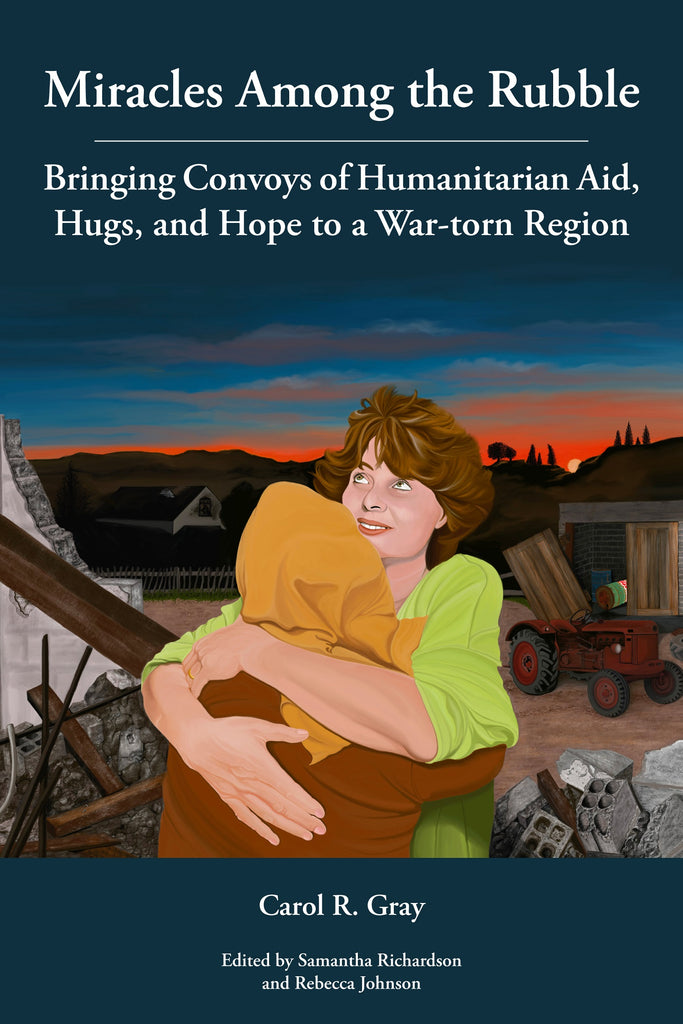






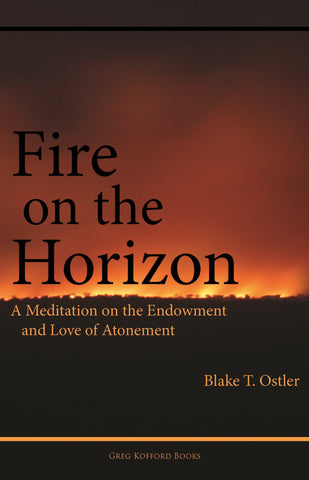
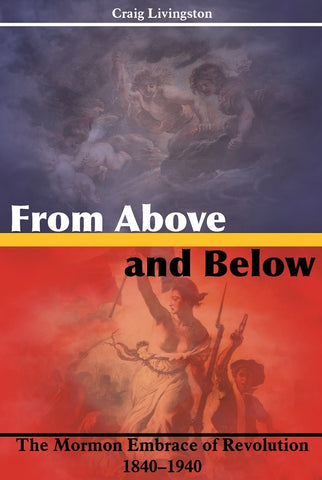
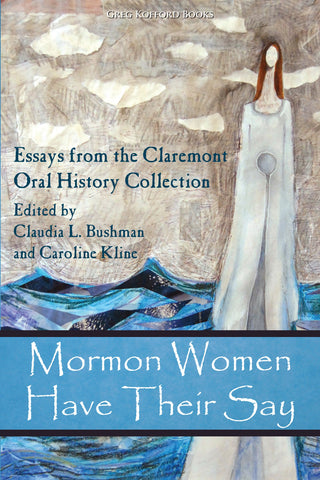
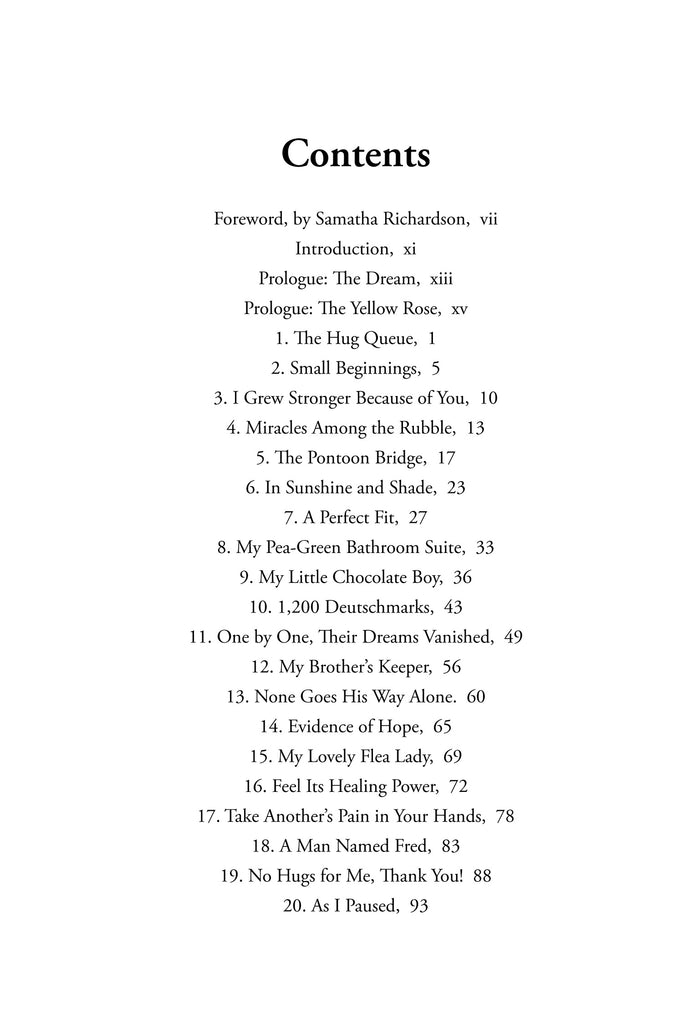
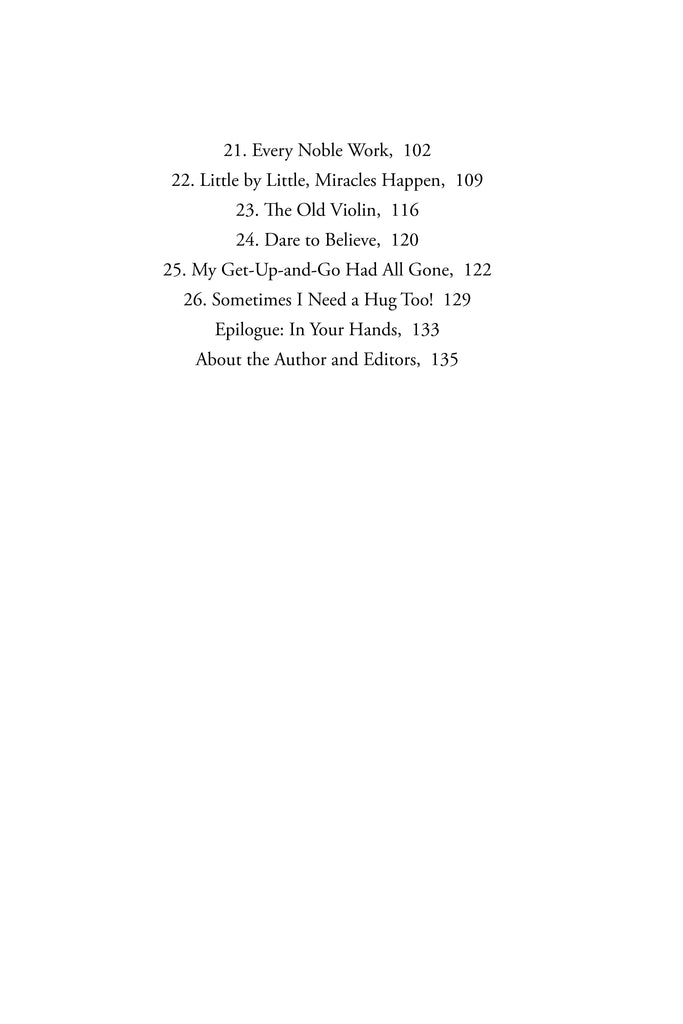
Share this item: